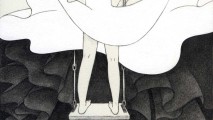It was my mother who first heard me say it. My mother, whom time and circumstance had never allowed the luxury of the birth control pill, who had planned only one of her five children, who had conceived her fifth child after a botched tubal ligation, who’d spent the childhoods of her oldest three in her bedroom, the shades drawn, depression pinning her beneath the sheets of her queen-size bed, did not laugh or dismiss or ignore the random question that passed directly and without hesitation from my brain to my lips one day. “Do you think it could be the birth control that’s making me so depressed?” The never-bubbly, always-direct voice of my mother: “Yes. Certainly.”
I knew, several months into the Pill’s ironically nine-month-long sojourn, that, even if circumstance was the provocation, my body’s reaction was far stronger than seemed appropriate or, in any way, typical.
I had plenty of reasons to be depressed. I’d graduated from college a few months before, I missed with great agony my boyfriend of four months, my closest friends were scattered all over the country, and I was living at home with my mother, making a meager living, editing reference books on a computer screen.
Depression had been an expected, though never invited, guest, as far back as I remembered. I had never and could never separate it from my life; living was always waiting. In recent years, I’d begun to get a hold of it. Its knock was decreasingly a surprise; I had learned to open the door instead of barricading it. I knew, on some level of consciousness, that eventually, it would leave.
This one wouldn’t leave. There was no waiting room, no intermission in which I could catch my breath, see it as a tangible, foreign presence. It lost its foreignness, camouflaged itself, and I was fooled.
I spent the good part of those months, crying. I cried over the monotony of my life, the insanity of my life, the fact that I was so close to my family and their unresolved issues, the fact that I was so far from my friends and their unresolved issues. I cried because someone hadn’t returned my phone call. I cried because my mom wasn’t going to be home for dinner. I cried because Ross and Rachel on Friends broke up.
I also spent a good deal of the workday in lavatory stalls, sobbing and sobbing until, after twenty minutes—by then, choking and heaving—I’d force myself to stop, then spend ten minutes attempting to restore my eyes to their normal state. In between visits to the restroom, I would find small things to cry about at my desk. Upon returning home, I would sleep for an hour or so (maybe cry a little, before or after), eat dinner, talk on the phone a bit (and, depending on whom I talked to, sometimes cry some more), then write something sad in my journal, read some sad poetry, turn out the light, and cry until I fell asleep.
It wasn’t by the toilet-paper-thin informational leaflet on the Pill that gets tossed into the bag at the last moment, with the receipt, that I began to suspect anything was wrong.
- Vaginal bleeding…
- Fluid retention…
- Melasma…
These “major” side effects are explained in a paragraph or sentence first, and then the others, obviously deemed more “minor,” such as depression, nervousness, loss of scalp hair, and vaginal infections, are listed. “If any of these side effects bother you,” the pamphlet consoles, “call your doctor or health care provider.”
I have never understood how one distinguishes the body’s abnormal behaviors due to circumstance (stress, trauma, sleep deprivation, etc.) from those due to chemical reaction (to food, medication, etc.). And besides, most women I know simply say, “I don’t want to know.” They take one look at the headings on the sheets: “Who Should Not Take Oral Contraceptives,” “Risks of Taking Oral Contraceptives,” “Estimated Risk of Death from a Birth Control Method or Pregnancy,” and “Warning Signals,” and they’ve seen enough.
It was three weeks after I’d called the doctor’s office from a pay phone to place the order, received the prescription slip in the mail and introduced the extra jolt of estrogen and progestogen to my bloodstream, that my boyfriend visited.
I don’t remember the first time he, smushed up against me in my childhood twin-size bed, came inside me, bare. This is how I liked to think about it because for me—like most women—it wasn’t so much the physical feeling that improved, but the physical knowledge that it was him, not his gloved size and shape, but all of him. The knowledge of its realness, of his realness, didn’t need to be manifested in the act itself. I experienced it even before his visit. It was a romantic notion; this is what really caught me up about it.
I don’t remember the thrill of not having to set apart that act—come to a mutual agreement that yes, it’s time, reach over to the windowsill, open the wrapper, and veil him. In all of my attempts to evoke these memories that might reconcile those nine months, the lens never focuses on his body, his nakedness, or even our naked bodies, merged together. It’s only my body that I see.
Only on mornings when I awoke feeling particularly cynical did I pause at all before popping the pastel pill into my mouth. Mid-pop, I’d draw the Pill, pinched between my forefinger and thumb, back in front of my eyes. Then, I’d glare suspiciously at it, like, “Hey, if you can do all that, what else can you do?” until, finally, I shrugged, and popped the thing in my mouth.
Only in the most dangerous of moments do I look back, nostalgically, at those nine months, and shame myself—shame both of us—for taking for granted that pill and the thoughtlessness it accommodated. Only when the decision, the reach, the unwrapping and putting the damn thing on takes far more time than either of us wishes to spare, when we’ve both decided that we can’t wait and the more we say this out loud, the more we egg each other on until we’re literally trying to break the other, trying to make the other say, “to hell with it” so that, it is thought subconsciously, it wasn’t me who decided, it was you, do we grieve that pill. The grief never lingers into those moments just afterward, after the tightrope dances have played themselves out and the desperation has been quelled just in time. By then, we are detangled, detached, and he is standing up, and I have only this body—stretched out in front of me—to consider, once again.
Days of clarity, of self-recognition, came only occasionally within nine months. They came when they came. I would look up, then, and slowly begin reflecting, begin forming the question, “What’s happening to me?” and by then, the day would have ended and carried the question off with it. That is, of course, the greatest irony of mental illness: it not only invades the mind, it becomes the mind.
In between days were moments, rare moments and short moments that never continued beyond a sentence. I recall saying to someone in the midst of all this, “There’s something inside me.” Taking it any further, though, was impossible because I was so certain that all was chaos—hopeless, endless chaos. To admit that there might be a solid, grounded reason for the play of marbles inside my head would require questioning this certainty, the only certainty I could claim at that time.
There was no such thing as “gut instinct” anymore. I knew these things: that I was more miserable than I’d ever been before, and yet the circumstances of my life had been far worse before. It would all lay itself out quite logically and then, when my reaction refused to utilize, or even acknowledge, the logic, I became even more depressed. I could see the light, far, far ahead. More often than not, it was for this fact that I cried: that I’d been sane before, that I knew I could be sane again, I just didn’t know how to get back there.
The response of my mother—who gave birth to my brother, her first born, in the year of the Pill’s release, who had married a strict Catholic who blessed her with three children in their four-year marriage—kept the moment, and my single, random question, lingering. “Yes. Certainly,” she said.
I then posed the question to a close friend, my depression confidante of five years. “Yes!” she shouted through the phone receiver, telling me of an article she’d just read. For women with a history of depression, she reported to my exceedingly alert ear, the Pill can take their depression to a completely new level.
These words, paraphrased from an article I’d never read, have still never read nor found, glimmered with more sense than anything I could remember having known before. I took them. With them, I filled the space in my gut where my instinct used to lie.
I finished my final pack of pills less than a month before I was to move to Chicago with my boyfriend. The pill that promised convenience above all else had, in effect, waited until the very month when it would be most regularly cherished to show its true colors. This irony—this utter inconvenience—was not spoken of during the phone conversation when I told him that I had had enough, that we would need to resume using condoms. He—knowing full well of my struggle—uttered no word of protest, even disappointment. He knew, almost as well as I did, that in tossing that nearly empty pack into the trash, I had simultaneously surrendered and restored control.
Amanda Hiber is Lecturer in English at the University of Detroit Mercy where she teaches courses in first-year composition, creative writing, and women’s and gender studies. She graduated from Beloit College with a B.A. in English and History in 1996, and from the University of Arizona with an M.F.A. in Creative Non-Fiction in 2000. Her essay, “Size Matters,” a personal and intellectual meditation on body size, was published in Clackamas Literary Review in 2004. She is currently working on a memoir about being raised by a single father.
Related Posts
« LOST WOMEN — Martha Clarkson WITH ARMS STETCHED OUT — Lisa Napolitan »









































